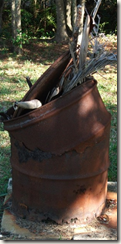Google says “no, you can’t farm rankings…”
If you’re like me, content farms make finding answers online that much harder. They drive me nuts, polluting searches will meaningless, useless, boilerplate content.
What is a content farm?
A content farm is a type of web site where all the content has  hyperlinks to itself and other sites owned by the same company / person. These farms consist of thousands and thousands of web pages, each containing phrases and keywords explicitly targeting the casual user. Why? Because they have a bunch of advertisements and get paid for displaying them. Think of it as building your own highway with your own billboards, then cheating the system by posting detour signs and cones on the public highway.
hyperlinks to itself and other sites owned by the same company / person. These farms consist of thousands and thousands of web pages, each containing phrases and keywords explicitly targeting the casual user. Why? Because they have a bunch of advertisements and get paid for displaying them. Think of it as building your own highway with your own billboards, then cheating the system by posting detour signs and cones on the public highway.
 Content farms are low quality content. Maybe you’ve stumbled on a page like “how to get a job” and the instructions are crap like “make a resume, look in the paper, search online, apply!” You may thought to yourself, “why would anyone take the time to put this online?”. Welcome! You’re part of the club of millions of people that have had their search for relevant information interrupted by a content farm.
Content farms are low quality content. Maybe you’ve stumbled on a page like “how to get a job” and the instructions are crap like “make a resume, look in the paper, search online, apply!” You may thought to yourself, “why would anyone take the time to put this online?”. Welcome! You’re part of the club of millions of people that have had their search for relevant information interrupted by a content farm.
Basically, it’s a website that just full of garbage designed to get you to click a link. Usually, the link is written in such a way as to match terms you recently searched for.
Anyway, content farms have exploded lately because they work. Well, maybe no anymore.
Google didn’t give any details (they never do). But here’s we do know.
- It’s only in the U.S.
- It should affect about %11 of searches
- It will be rolled out internationally soon
- It will affect the rankings of many sites.
- It doesn’t rely on user feedback.
From the blog post (linked above) by Amit Singhal and Matt Cutts, here are some key quotes:
a change that noticeably impacts 11.8% of our queries—and we wanted to let people know what’s going on. This update is designed to reduce rankings for low-quality sites
It’s worth noting that this update does not rely on the feedback we’ve received from the Personal Blocklist Chrome extension, which we launched last week. However, we did compare the Blocklist data we gathered with the sites identified by our algorithm, and we were very pleased that the preferences our users expressed by using the extension are well represented. If you take the top several dozen or so most-blocked domains from the Chrome extension, then this algorithmic change addresses 84% of them, which is strong independent confirmation of the user benefits
So the war has begun against the content farms. This is good news for users, and bad news for crappy content.
The age of “content is king” is dead.
Welcome to the age of “good content is king”.
